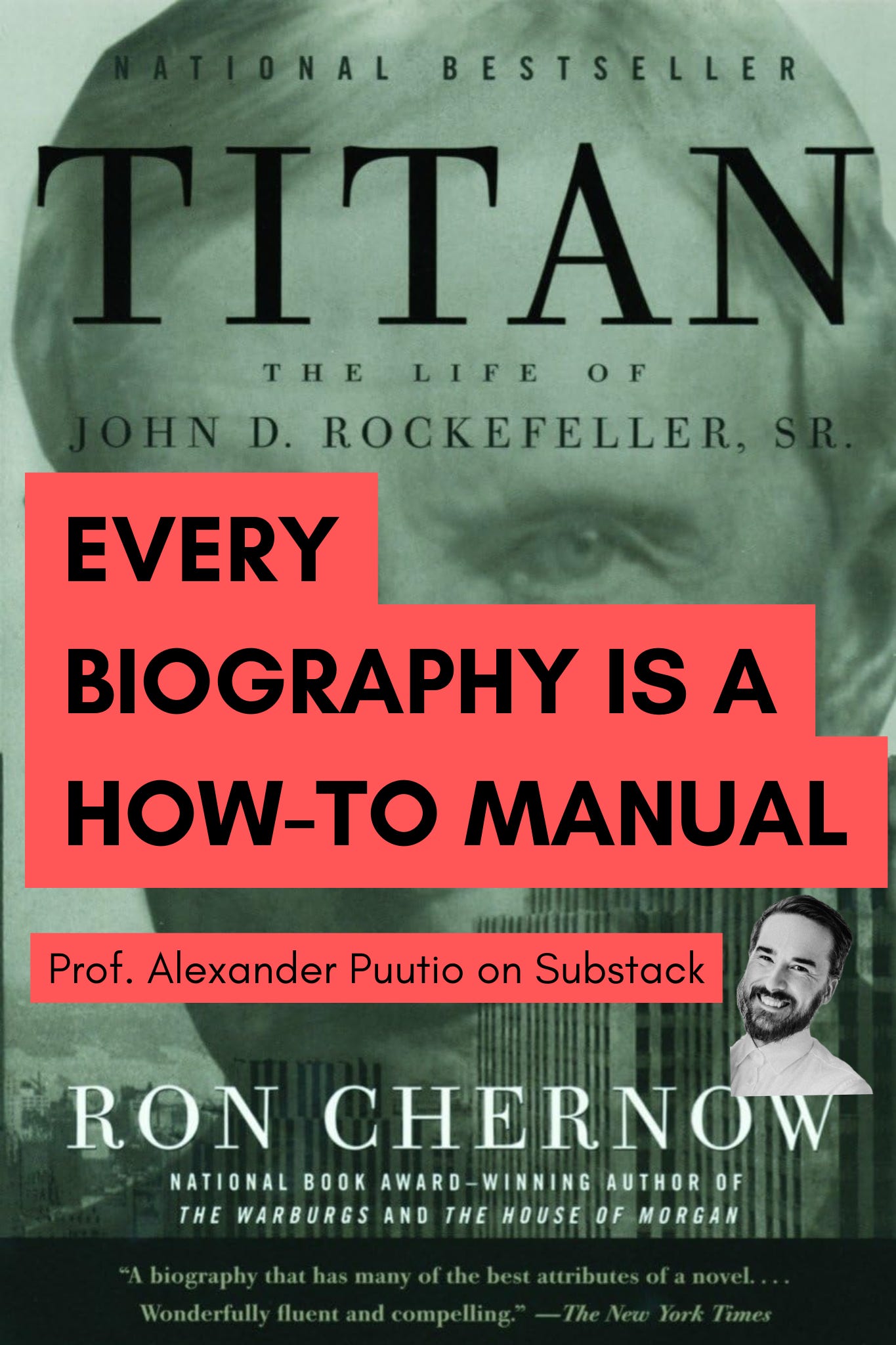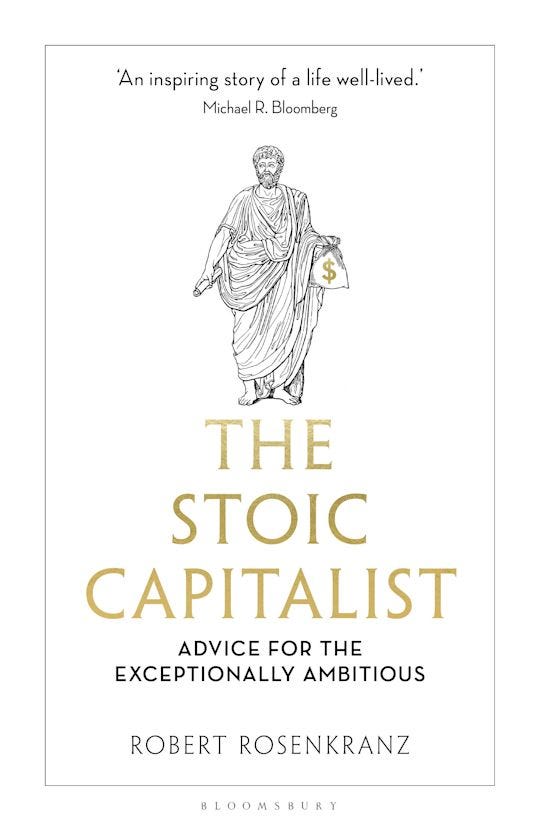I Didn’t Know How To Read Memoirs Until a Billionaire Explained It to Me
How I came to be embarrassed about my lifelong disdain of biographies thanks to a billionaire who accounts his success to reading them the right way.
In this issue:
How a billionaire taught me to read memoirs differently
The mindset shift that turned biographies into blueprints
A signed copy of The Stoic Capitalist up for grabs
My favorite tool for capturing ideas that matter
Why the weird email timing?
Each issue goes out at when one of my sons were born and made me whole.
This one comes at Matias’o’clock - enjoy!
So I Met A Billionaire Who Accredits His Success to Reading Biographies
Corner offices are funny things.
Neat enough that most of us spend a good chunk of our lives trying to get one for ourselves. The one inhabited by Robert Rosenkranz, philanthropist, former CEO of Delphi Financial Group, founder of Open to Debate, and now author of The Stoic Capitalist: Advice for the Exceptionally Ambitious, is a particularly enviable specimen.
Panoramic views that wrap around the building. A glimpse of Central Park here, a hint of Lady Liberty, at least if you squint hard enough and let imagination do some of the lifting.
Of course, there are plenty of corner offices in New York. Even more impressive ones, I’m sure.
And to be honest, it’s not the office itself that fascinates me, not anymore. Though I’d be lying if I said I hadn’t once dreamed of working my way into one, first as a baby attorney, later as a management consultant, climbing the pyramid, clawing my way toward increasingly orthogonally-delineated real estate.
That was before I denounced the entire concept of offices more or less altogether (more on Forbes).
Now I find myself far more interested in how people got themselves cornered, with the path, not the property, being the object of my focus.
The Default Career Ladder is Designed to Spit You Out
In most cases, the journey is predictable.
Get the degree (JD/MBA preferred), talk your way into the right job, grind your way up the ladder and maybe step on a few others while you’re at it. Wake up at 6am like a champion and rinse/repeat until the title and the skyline are yours. Great success.
We could just as well call this the “just desserts” path.
Play by the rules, take only corporate-approved risks, and eventually receive what you’ve been told (and what you’ve always known) you deserve.
The beauty of this model is that it absolutely works. But only if you don’t ask too many questions along the way.
Big law and big consulting are among the industries that are built on this model, a perpetual motion machine designed to churn and replace. In fact, in a recent interview, the global head of HR at one of the big consulting firms told me they churn 25% of staff on purpose.
I now make a habit of telling this to every one of my outgoing students so they don’t walk into the meat grinder unarmed. Instead, I want them to go in knowing exactly what they are up against, and how to game the system to their ends as much as they can, all the while the company dangles the partnership carrot in front of them knowing that a sizeable portion of each cohort will never make it. May the Squid Games commence.
But Robert didn’t follow that path
His route to 590 Madison wasn’t linear, predictable, or bureaucratically blessed.
It was nothing if not entirely rangeful. Imaginative, filled with curiosity driving him, and oddly inevitable in hindsight.
When his new book came out, we met for a conversation that veered across decades and domains from growing up with less than nothing to managing $80+ billion in assets. I’ll be writing a profile on Robert soon, and trust me, there’s more to tell.
But today I want to share just one thing with all of you here in our secret Substack society for the curious: the moment that most caught me off guard was how Robert says he built everything around him by reading biographies.
Weaponized curiosity: how to read biographies like a billionaire in the making
I always start these kinds of conversations by gently probing for early, foundational habits, the rituals that shaped who someone became.
Without hesitation, Robert pointed to his lifelong habit of reading biographies.
Not passively. Not for entertainment.
But as a deliberate system for studying how people build the lives they want.
He described biographies as how-to manuals for sparking and navigating his own ambitions. He rattled off pivotal decisions made by Rockefeller, explained Ford’s approach to scale (and Taylorism) from memory, and in doing so, he turned my lifelong skepticism of the genre into quiet embarrassment.
I’ve always dismissed biographies, and I’ve never shied away from saying so.
They are too slow and too polished. Too self-important and often an ego-driven exercise in post-hoc storytelling and selective memory.
I am legally obligated to say that my dismissal of nonfiction goes much deeper than this.
The only nonfiction I’ve read this entire year has been The Perfect Horse, and that was a student’s recommendation which I take seriously knowing they do the same with mine.
Clearly, I’ve been missing the point.
What Robert jolted me into understanding is that I should be approaching biographies exactly as I do all the nonfiction I imbibe, scanning each page for the essentials of life I seek from the books I read.
And that shift, seeing a memoir not as a story but as a tactical read, changes everything.
From Trump Tower to Amazon
As I left his office, which just happens to sit next to Trump Tower, I walked past the gold-plated chaos and the circus of Trump-memoriabilia without noticing much of my surroundings.
One we had exchanged (a very firm) final handshake, I had made beeline into a deep and furious scroll through Amazon.
I ordered my first real biography in years: Titan, the Rockefeller book that had clearly left a dent on Robert’s own thinking.
Will it do the same for me?
Perhaps my range-addled career is beyond what a biography can repair, but for now, I’ve learned to open a door I had long kept shut for no good reason at all.
Giveaway: A Signed Copy of The Stoic Capitalist
If you’ve made it this far (thank you), I have a small treat.
Robert gave me a signed copy of his book, one I carried proudly through the NYC rain, from midtown to Brooklyn.
And I’m giving it away to one of you.
Refer a friend to this Substack and you’ll be entered to win it. Winner announced end of May.
A book to read
The Stoic Capitalist by Robert Rosenkranz
I didn’t expect to like this book as much as I did, given my prior aversion to biographies or anything closely adjacent thereto.
But Robert pulled off something I didn’t think was possible, a not-memoir that still manages to be a damn good how-to manual for the ambitious and curious.
It’s sharp without being self-important. Reflective without dragging.
And quietly full of lessons for anyone trying to build a life that holds up under pressure.
I’ve been thinking a lot about how we read the stories of others. This one made me realize I’ve been doing it wrong. I’ll have a full profile up soon, but for now, just read the book.
Question your own dogmas
I used to think biographies were a waste of time — bloated ego trips dressed up as wisdom.
I was wrong.
This week, try interrogating one of your own dogmatic beliefs. What category of knowledge, story, or habit have you dismissed entirely? Why?
We close more doors on ourselves than the world ever does.
Open one back up.
Prompt: What’s a memoir you haven’t read that could work as a how-to manual for the life you want? If it costs less than 10 dollars on Amazon (shipping included), why not make the jump?
A thought to have
Weaponized reading
What if everything you read was a how-to manual?
Not in the obvious way — but in the way where every story becomes a blueprint, every setback becomes pre-game notes, and every win maps a direction.
This is how Robert reads. This is how I plan to read from now on.
Reading isn’t just input. It’s training.
Mental model: You can do everything with a vengeance, even reading.
A product to love
Google Keep (or any fast-capture app)
We used to scribble in the margins of books. Now we scroll and forget.
Google Keep has become my modern marginalia. Quick thoughts, lines that hit, questions I’m not ready to answer, they all go there. And from there, they go to a Google Sheet at the end of each month.
It helps me organize ideas as well as catch them before they drift away.
Start a tag for every book you read and treat your highlights like puzzle pieces.
You’ll be stunned by how much insight you’ve already earned, you just never kept it visible.
Recent writings on Forbes and beyond
Latest: Never Make a Bad Choice Again by Embracing Self-Nudging (Psychology Today)
The Psychology Of Better Choices: How Startups Are Rewiring Our Habits (Forbes)
Staying Curious Is the Most Dangerous Thing You Can Do (Psychology Today)
After Arkansas: The Future Of FEMA And U.S. Disaster Relief (Forbes)
Ryan Gellert on Building a Future Where Sustainability Is Not Optional (Forbes)
Why Struggling (the Right Way) Helps You Learn (Psychology Today)
Want to Make Better Decisions? Copy the Slime Mold (Psychology Today)
Your Brain Was Built to Forget—Make It Work For You (Psychology Today)
The Case For Terminal Optimism In An Unpredictable World (Forbes)
The AI Coordination Revolution You Haven’t Heard About Yet (Forbes)
Let’s meet up, I’m talking at
Thomson Reuters’ Momentum AI on how to actually succeed with adopting AI, New York
DotGO RCS Event.
Glean:GO 2025, SF
AIAI Generative AI Summit, New York
A wonderful set of classes on Persuasion and Leadership at Columbia and Harvard
I am currently conducting a study on range and how it impacts people’s career trajectories. Ten questions and a name will get you on the hall of fame as we pump up the n on the study. Link below - thanks for considering it!
You’ve reached the end - thanks for scrolling all the way down!
Curiosity is best when enjoyed in great company.
Refer this issue and grab a chance to get a signed copy of Robert’s book.
If you end up getting a copy yourself, drop a line in the chat below - let’s exchange notes!











